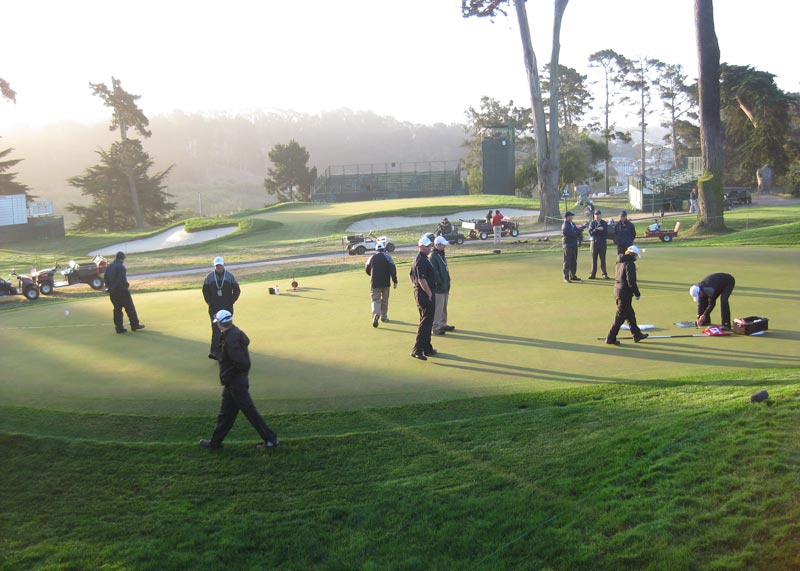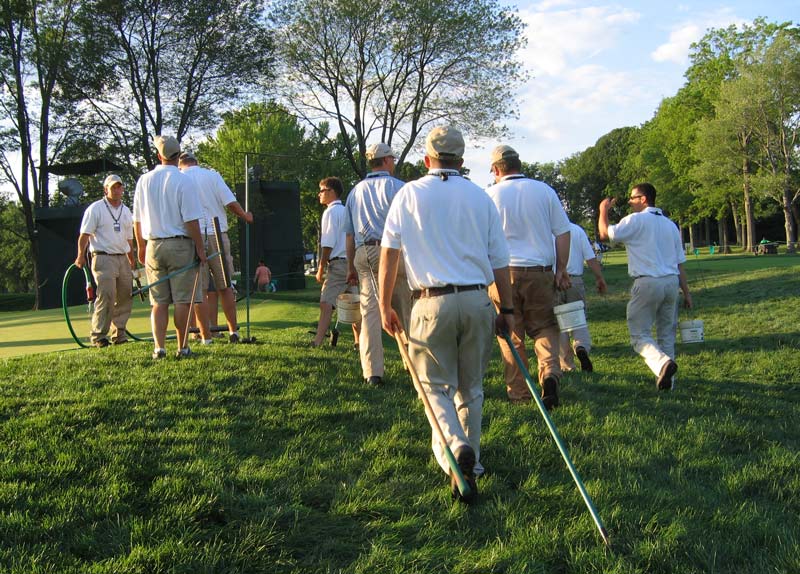
Photos by GCM staff
In 1985, I worked the U.S. Open at Oakland Hills Country Club in Birmingham, Mich. The purse was $650,000, and the winner, Andy North, took home $103,000. By comparison, the 2018 U.S. Open purse at Shinnecock Hills was $12 million, with the winner, Brooks Koepka, taking home $2,160,000.
Adjusted for inflation, the $103,000 that Mr. North earned in 1985 would be $245,745.48 in 2019. That’s approximately nine times less than Mr. Koepka was awarded in 2018. So, the question is, where did all the extra money come from? The answer is increases in television broadcast time, sponsorship, and advertising focused on high-end watches and expensive cars. No blue-collar beer commercials here.
To put things in perspective, the first nationally televised U.S. Open was in 1954. It aired for a total of two hours on a Saturday. Note that it was a three-day event, with 36 holes played on the final day, a Saturday. In 1965, it became a four-day event and was televised for three hours. There were seven hours of coverage in 1977, and for the first time, there was 18-hole coverage of the leaders during the closing round. By 1982, coverage had ballooned to 14 total hours of TV by two networks, ESPN and ABC. In 2018, the U.S. Open accounted for 37 hours of television time.
This increase in television coverage has enhanced sponsorship and advertisement, enlarging the purse. In addition, growing on-site audiences have generated funds for numerous local charities.
Golf is a wonderful game, but one group is not sharing in this wealth.
Why are volunteer maintenance staff needed to prepare the course for the best players in the game, competing at some of the most prestigious clubs, which have some of the richest members in the world? I could be mistaken, but I don’t think the professional sportscasters, cameramen, technicians or crews that set up and tear down grandstands, etc., are volunteering their time for professional golf. No one would suggest that David Feherty volunteer his entertaining commentary at tournaments, because he does not work on the golf course staff.
It is certainly wonderful that golf course superintendents have been supportive of one another, and I am not implying that it should end immediately. I am just asking: Isn’t it time educated and experienced golf management employees earn compensation for the meticulous work they perform while setting up a world stage? So far, trickle-down economics has not worked for the golf course crews at these events.

As they state their appreciation for the profession of golf course management, the GCSAA, USGA, PGA and even Golf Channel commentators have acknowledged a shortage of qualified management and staff on golf course ground crews. In addition, university turfgrass management programs continue to report lagging enrollment, partly because of the cost of education compared with starting income.
In 1992, I paid $1,579.50 for 19 credits at Michigan State University. Adjusted for inflation, that would be $2,940.47. The minimum a student would have paid for 19 credits last semester at Michigan State was $9,158. As a turfgrass management educator, I think it wouldn’t hurt enrollment if students knew the profession was compensated as much as it was appreciated. Even the socialists in America are capitalists first.
It is noble to volunteer to help those less fortunate than oneself, but I don’t understand volunteering to help those that are more fortunate. If an equivalent of 1% of the purse were split among the volunteer crew, each could easily be taking home $25 per hour.
Should we work toward relationships so that the educated caretakers of golf course grounds are compensated at these events? This seems like low-hanging fruit, and we should not have to shake the tree too hard.
Please send me your comments via email.
Thomas A. Nikolai, Ph.D., the “Doctor of Green Speed,” is the turfgrass academic specialist at Michigan State University in East Lansing, Mich., and a frequent GCSAA educator.